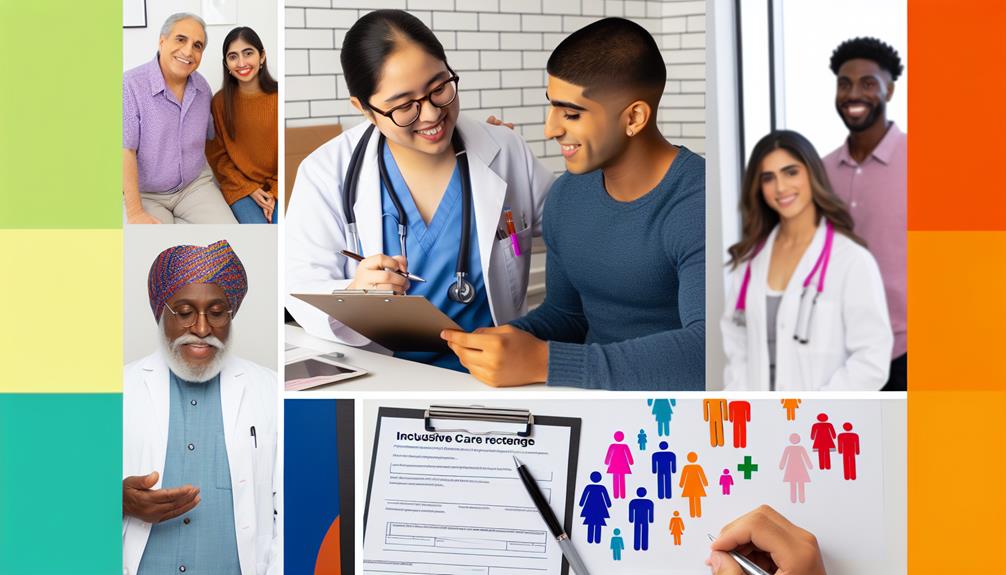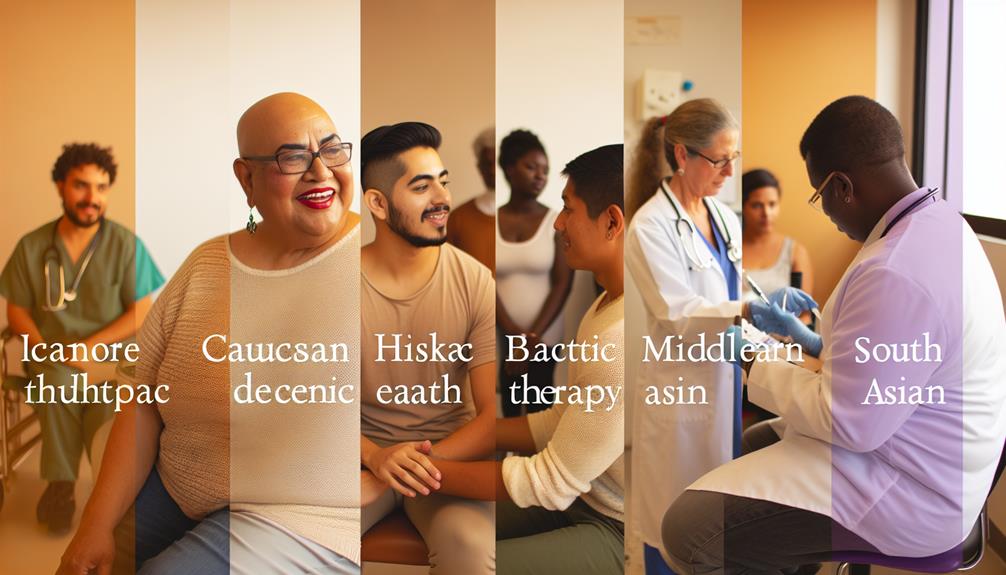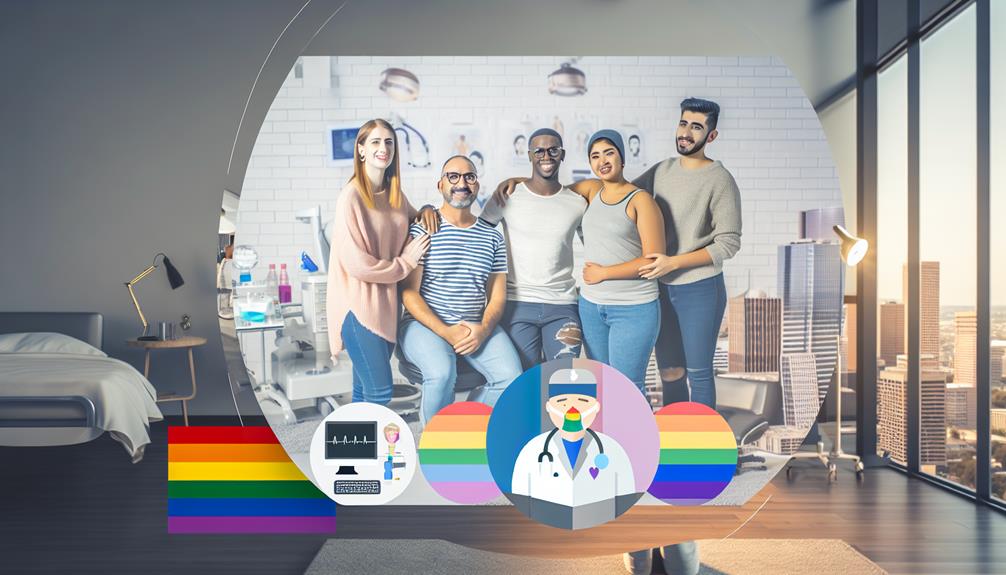Want to make healthcare more accessible for LGBTQ+ individuals in Houston? Let's dive into the unique challenges they face and how tailored services can make a difference.
From inclusive training programs to partnerships with advocacy groups, Houston is on its way to creating a more welcoming healthcare environment. Community centers and specialized services are key in closing the gaps in access.
Stay tuned to see how these efforts are reshaping healthcare for LGBTQ+ people in Houston.
Importance of LGBTQ+ Healthcare Access
Making sure that LGBTQ+ folks can access healthcare without facing discrimination is crucial. The LGBTQ+ community deals with a lot of health challenges, like higher rates of mental health issues, HIV, homelessness, and more. Getting proper LGBTQ healthcare is key to closing these gaps and giving the right support to this community.
Programs that advocate for LGBTQ+ healthcare play a big role in improving access to care, pushing for policies that are inclusive and understanding in healthcare settings. When healthcare providers aren't well-informed or trained, it can lead to unfair treatment and prejudice against LGBTQ patients. Having electronic medical records that are inclusive is vital to ensure LGBTQ+ individuals get the care that fits their specific needs.
Challenges Faced by LGBTQ+ Community
The LGBTQ+ community faces a range of health challenges that urgently need attention to ensure they can access proper healthcare. Issues like higher rates of depression, suicide, mental illness, HIV, obesity, and homelessness are more prevalent among LGBTQ+ individuals compared to the general population. These disparities are worsened by obstacles in healthcare settings, such as the limited options for sexual identity and gender preferences in medical records.
Additionally, many healthcare providers hesitate to treat LGBTQ+ patients due to insufficient training, adding to the difficulties in accessing necessary services. In Houston, the absence of citywide nondiscrimination protections further compounds the challenges faced by the LGBTQ+ community in finding inclusive healthcare environments.
Discrimination and lack of support also threaten LGBTQ+ Texans in areas like housing, employment, and healthcare. It's essential to address these barriers to improve the overall health and well-being of the LGBTQ+ population.
Strategies for Inclusive Healthcare Services

In Houston, making sure that healthcare services are welcoming and inclusive for the LGBTQ+ community is key.
Providing training for healthcare staff on cultural competency is a vital step in this direction. This kind of training gives providers the know-how and skills they need to offer respectful and affirming care to LGBTQ+ individuals.
Training for Staff
When it comes to LGBTQ+ healthcare, providing top-notch services starts with thorough staff training. This training covers key areas like gender-affirming care, using the right pronouns, and being culturally competent to meet the unique needs of LGBTQ+ individuals.
By educating healthcare providers on topics such as hormone therapy and preventive care, staff can create welcoming environments, understand diverse identities, and help decrease healthcare disparities. The focus is on clear communication, maintaining confidentiality, and showing sensitivity to LGBTQ+ patients' experiences and worries.
Continuous education ensures that healthcare staff are up to date on LGBTQ+ health issues, best practices, and legal requirements for delivering fair and inclusive care.
Culturally Competent Care
Improving LGBTQ+ healthcare access in Houston means making sure healthcare services cater to the specific needs of the community. Treating LGBTQ+ patients with respect is key, which involves providing gender-affirming care, hormone therapy, and mental health support.
To make this happen, healthcare providers must be trained in LGBTQ+ health issues and cultural competency. Creating a welcoming environment is crucial for LGBTQ+ individuals to feel comfortable seeking care. Inclusive policies like using respectful language and honoring chosen names and pronouns are essential for making LGBTQ+ patients feel valued and safe.
Role of Community Centers in Access
Places like The Montrose Center in Houston really make a difference in LGBTQ+ healthcare. They offer a variety of services like counseling, medical care, and support groups.
These centers create a safe space where folks can connect with licensed therapists and healthcare providers who understand their unique needs.
Community Center Services
When it comes to LGBTQ+ community centers in Houston, like The Montrose Center, their impact on healthcare access for individuals in the community is truly remarkable. These centers go above and beyond to provide crucial services tailored to the LGBTQ+ community's needs. Here's a closer look at the key offerings of these centers:
- Supporting Mental Well-being: The Montrose Center offers a range of mental health services, from counseling to psychiatry, and even free wellness programs. These services are vital in addressing the unique mental health challenges faced by LGBTQ+ individuals.
- Creating Safe Spaces: Community centers serve as havens where individuals can connect, share their stories, and find solace among peers who understand their struggles.
- Championing Rights: Advocacy is a cornerstone of LGBTQ+ centers, where they tirelessly fight for the rights of the community. They also provide accompaniment services, including critical support for survivors of violence.
- Tailored Programs: Specialized initiatives like SPRY at The Montrose Center cater to specific demographics, such as LGBTQ+ seniors aged 60 and over. These programs offer tailored support groups, outreach efforts, and case management services.
In a nutshell, these community centers are lifelines for many in the LGBTQ+ community, offering not just services but a sense of belonging and support that can make a world of difference.
Outreach Programs
Community centers like The Montrose Center in Houston are lifelines for LGBTQ+ individuals, offering a wide range of crucial services to support their health and well-being. These centers go beyond just providing healthcare; they create safe spaces and tailored outreach programs to meet the diverse needs of the LGBTQ+ community.
One standout program is The Montrose Grace Place, which is dedicated to supporting LGBTQ+ youth experiencing homelessness. They offer mentorship, meals, clothing, and help in accessing essential services. This kind of support can be a beacon of hope for young people facing tough circumstances.
Additionally, initiatives like the T.R.U.T.H. Project focus on mental, emotional, and sexual health resources specifically designed for LGBTQ+ communities, with a special emphasis on communities of color. By tailoring their services to address unique challenges, these programs are breaking down barriers to healthcare access.
Supportive Environment
In the realm of LGBTQ+ healthcare access in Houston, community centers like The Montrose Center play a crucial role in creating a supportive environment for individuals seeking behavioral health services and support. These centers are lifelines for the LGBTQ+ community, offering a safe haven and vital services. Let's delve into how these centers make a difference:
- The Montrose Center provides a range of services including adult primary care, psychiatry services, and a wellness program that's completely free of charge.
- Programs like SPRY cater to LGBTQ+ seniors, offering community outreach and case management tailored to their unique needs.
- For LGBTQ+ youth facing homelessness, The Montrose Grace Place steps in with essentials like meals, clothing, toiletries, and valuable mentorship.
- The T.R.U.T.H. Project is dedicated to enhancing mental, emotional, and sexual health for LGBTQ communities of color, offering crucial support programs and safe spaces.
These community centers aren't just places to seek help; they're pillars of strength and empowerment for LGBTQ+ individuals, providing a sense of belonging and support that's truly invaluable.
Collaborating With Advocacy Groups
When you team up with advocacy groups in Houston, you're not just supporting LGBTQ+ healthcare access – you're making a real difference in addressing the disparities that exist. These partnerships are essential for pushing for healthcare practices that cater to the unique needs of the LGBTQ+ community. Together, you can drive policy changes, secure more funding, and launch awareness campaigns that specifically target the healthcare gaps faced by LGBTQ+ individuals in Houston.
Advocacy groups are at the forefront of ensuring LGBTQ+ representation and support. They push for training programs for healthcare providers and advocate for creating safe and inclusive spaces within healthcare settings. By collaborating closely with these groups, healthcare providers can deliver care that's culturally sensitive and foster an environment of diversity and inclusion in their services.
Addressing Specific Health Needs

Teaming up with advocacy groups in Houston enables a targeted approach to meeting the specific health needs of the LGBTQ+ community. In Houston, several healthcare providers offer specialized services to effectively address these needs:
- Legacy Community Health: Provides no-cost HIV, syphilis, and hep C testing exclusively for LGBTQ+ individuals, ensuring early detection and prompt treatment for these common infections.
- Planned Parenthood Gulf Coast: Delivers affordable hormone therapy and STI testing services tailored to the LGBTQ+ community, promoting accessible and comprehensive care for gender-affirming treatments and sexual health maintenance.
- Thomas Street Health Center: Focuses on delivering specialized care for transgender individuals and adolescents in Houston, meeting the unique healthcare needs of these populations, including hormone therapy and mental health support.
- Crofoot MD: Serves as an LGBTQ+ general clinic in Houston with a specific focus on HIV/AIDS research and treatment, contributing to enhanced primary care services and advancements in HIV/AIDS management within the LGBTQ+ community.
Enhancing Awareness of Available Resources
When it comes to finding support for the LGBTQ+ community in Houston, there are some standout organizations and programs you should know about. Legacy Community Health and Planned Parenthood Gulf Coast are vital resources that offer free testing for HIV, syphilis, and hormone therapy.
The Montrose Center hosts educational workshops that focus on mental health and overall well-being for LGBTQ+ individuals. If you or someone you know is a survivor of violence, The Anti-Violence Program provides crisis counseling and emergency shelter assistance.
For LGBTQ+ youth facing homelessness, The Montrose Grace Place offers a safe space with meals, clothing, and mentorship. By spreading the word about these resources and encouraging community involvement, we can ensure that everyone in Houston gets the care and support they need.
Frequently Asked Questions
How to Make Healthcare More Inclusive for Lgbtq?
Let's make healthcare more inclusive for LGBTQ+ individuals by providing training for healthcare providers to better understand their unique needs. It's important to offer gender-affirming care and use intake forms that are inclusive of all gender identities. Mental health services should be sensitive to the LGBTQ+ community, and collaborating with local organizations can help create a more supportive environment. Building trust and increasing satisfaction among LGBTQ+ patients is crucial for their overall well-being.
How Can Nurses Improve the Quality of Care for Lgbtq+ Patients to Decrease Lgbtq+ Health Disparities?
If you're looking to improve LGBTQ+ patient care, as a nurse, it's crucial to dive into cultural training, foster inclusive environments, offer gender-affirming care, address mental health concerns, and team up with community organizations. These steps play a key role in narrowing the health gaps faced by LGBTQ+ individuals. As someone who has been in the field, I've found that these actions not only enhance patient outcomes but also create a more supportive and understanding healthcare setting for everyone involved.
How to Improve the Patient Experience for Members of the LGBTQ Community?
If you want to make LGBTQ+ individuals feel more comfortable and respected in healthcare settings, it's crucial to provide training on cultural sensitivity, offer gender-affirming care, use inclusive intake forms, connect them with support services, and ensure confidentiality. These steps build trust, increase satisfaction, and contribute to overall well-being. As someone who has navigated healthcare challenges as an LGBTQ+ person, I know firsthand how important it is to feel understood and supported in these environments. By implementing these practices, we can create a more welcoming and inclusive healthcare experience for all.
Is Kelsey Seybold LGBTQ Friendly?
Absolutely! At Kelsey Seybold, we strive to provide inclusive care for all our patients. While we may not have a specific label as LGBTQ+ friendly, our providers are well-trained to offer respectful and culturally sensitive care. You can feel comfortable discussing your healthcare needs openly with us.
